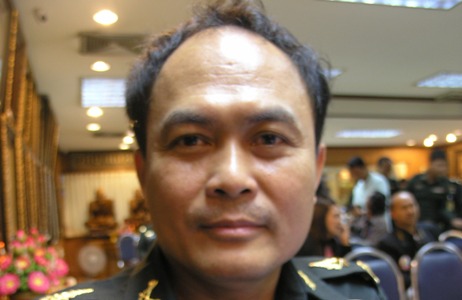Army ponders curfew option

The Fourth Army Region is mapping out certain areas and back roads which are vulnerable to insurgent attacks to be placed under curfew expected to be imposed after the end of the fasting month of Ramadan.
Maj-Gen Nakrob Boonbuathong, deputy director of the 5th Operations Coordinating Centre within the Internal Security Operations Command, told Isra news agency that curfew is necessary because there are not enough men to police the entire area of the three southernmost provinces. So, the alternative is to restrict the movements of the insurgents by means of a curfew, he said.
As a matter of fact, Maj-Gen Nakrob said that a cabinet’s approval is not necessary as the commander of the Fourth Army or his deputy is empowered to impose the curfew. However, he said that the army would have to inform the government when it is necessary for the curfew to be imposed.
He explained that the curfew might affect the people and, as such, the people themselves might be pressured to help the authorities.
Deputy Prime Minister Yutthasak Sasiprapa who was recently appointed head of a new command centre to handle unrest situation in the deep South confirmed that curfew was likely but in certain areas known to be the hotbed of the insurgents or vulnerable to insurgent attacks.
The idea of limited curfew was first floated by Defence Minister Sukumpol Suwannatat following a spate of deadly insurgent attacks during the Ramadan fasting month, including one car bomb in Raman district of Yala which killed five policemen and a drive-by shooting in Mayo district of Pattani which left four soldiers dead and two injured and a car bomb explosion at CS Pattani hotel in Pattani.
Commenting on the violent incidents during the Ramadan, Maj-Gen Nakrob said it was normal for the insurgents to launch attacks whenever there was an opportunity. Ramadan, he explained, offered a good opportunity because more people left homes during the night or at dawn to buy food to eat before they started fasting at sun rise until sun set. Moreover, many insurgents were brainwashed that that would be blessed if they killed non-Muslims during the fasting month, he said.
The fact that the insurgents managed to stage several deadly attacks did not mean that there were flaws in the army’s strategy or tactics, said the general, adding however that carelessness of individual soldiers made it possible for them to become easy targets for the insurgents.
Maj-Gen Nakrob maintained that the troops who were deployed in the three southernmost provinces were well trained in both conventional and guerrilla warfares. "The unrest problem cannot be resolved quickly because we have been restrained. But from now on, we must seriously ponder the curfew option to restrict the movements of the insurgents because we do not have enough men to police every inch of the territory."
Asked about peace talk with the insurgents, the general said he supported the idea. However, he noted that peace dialogue and suppression of the insurgency to reduce violent incidence are two separate issues. "We can have talk with the insurgents while at the same time we battle against the insurgents. Take the case of northern Island for instance, the war went on for more than 30 years before peace was restored in the last couple of years," he added.
----------------------------------------------------------------------------------------------
Caption : Maj-Gen Nakrob Boonbuathong
